Local Hog Butcher Class
[The following is a guest post by Valerie Stegemoeller, who, with her husband, has a small homestead northwest of Houston. You can follow their progress with farming at Stegesaurus Farm on Facebook. She is a co-leader of the Houston-Galveston Chapter of the Weston A. Price Foundation.]
Butcher Class – The Barry Farm
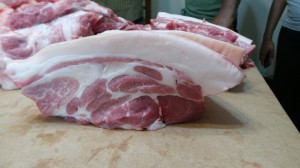
“The Barry Farm is a small family farm that focuses on pasture raised wholesome food. We strive to renew urban and suburban land and bring agriculture back into our daily lives. We currently offer Pastured Eggs, Pastured Poultry, Pastured Heritage Breed Red Wattle Pork and coming soon local Honey.”
My husband’s family used to do annual hog butchering until the 90s. Now that we started a small farm, and custom butchering for retail is VERY difficult to find (and more so wanting your animal to have as little stress as possible), my husband has been yearning to learn how to butcher animals on the farm. Chickens and rabbit were easy enough, but what about pork? Luckily, there was a small farm in Needville that hosts small classes for those who are interested in learning this lost art. Geoff and Renee are so friendly and always willing to share homesteading and farming tips for those interested in learning about food! Transparency is a major goal of their farming philosophy.
So when there was a class announced for June, I signed us up.
When we got there it was a very interesting group, with one central thing in common – we all were interested in 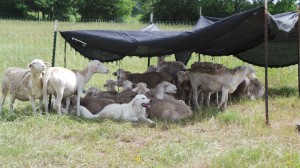 humanely raised food. First, we went out to the area of pasture where the sheep had recently been moved. Like us, the Barry Farm is convinced of the benefit of rotationally grazing animals (for pest management and efficient grass management). As it was Houston and summer and mid-day, all the sheep were huddled together under their mobile shade with their guardian dog. One interested thing is the Barry Farm doesn’t have to castrate their ram lambs because they are freezer-bound well before they pose any significant challenge to the main breeding ram. And yes, these guys are 100% grass fed, well, except for Clarendon the livestock guardian dog.
humanely raised food. First, we went out to the area of pasture where the sheep had recently been moved. Like us, the Barry Farm is convinced of the benefit of rotationally grazing animals (for pest management and efficient grass management). As it was Houston and summer and mid-day, all the sheep were huddled together under their mobile shade with their guardian dog. One interested thing is the Barry Farm doesn’t have to castrate their ram lambs because they are freezer-bound well before they pose any significant challenge to the main breeding ram. And yes, these guys are 100% grass fed, well, except for Clarendon the livestock guardian dog.
Then, we got to visit the pigs, which was such a treat for us since our neighborhood doesn’t allow us to raise pork. They had plenty of shade and mud and they actually are trained to drink out of water nipples! The babies were very friendly but they liked to chew shoelaces! These hogs are Red Wattle, a breed known for their fabulous marbling (the fat develops IN the meat/muscle, not just around it, creating a unique flavor and tenderness). Additionally, the Barry Farm blends their own feed to optimize the flavor of their pork.
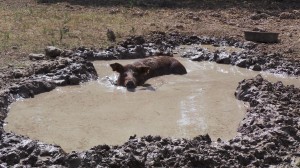
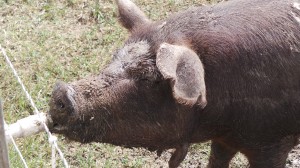
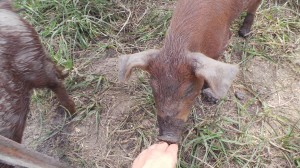
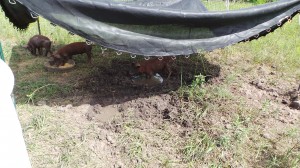
Finally, we visited t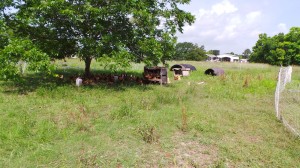 he garden and hens before going in to start the butcher class. The Barry Farm delivers eggs through a CSA program as well as supplies Fat Cat Creamery who uses the eggs for their small batch ice cream. (Probably a good reason they aren’t accepting any new egg customers at this time – I mean, it’s definitely ice cream season.) Also, the Barry Farm has bees on site who produce honey for harvesting, which they sell raw and unfiltered. I had some at the farm dinner days before this class and it was remarkable.
he garden and hens before going in to start the butcher class. The Barry Farm delivers eggs through a CSA program as well as supplies Fat Cat Creamery who uses the eggs for their small batch ice cream. (Probably a good reason they aren’t accepting any new egg customers at this time – I mean, it’s definitely ice cream season.) Also, the Barry Farm has bees on site who produce honey for harvesting, which they sell raw and unfiltered. I had some at the farm dinner days before this class and it was remarkable.
Time for learning how to break down a pig!
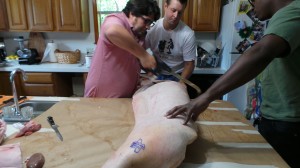 During the demonstration, a Houston chef showed us how to turn a whole pig into cuts with four basic tools – a saw, and three knives, including a cleaver and a flexible knife (possibly a boning knife) for cutting meat off close to the bones. All of us that attended got a bag full of our portion of cuts from the pig with advice from the chef on various cooking methods. When it was all divided up, the chef prepared a meal of grilled pork tacos.
During the demonstration, a Houston chef showed us how to turn a whole pig into cuts with four basic tools – a saw, and three knives, including a cleaver and a flexible knife (possibly a boning knife) for cutting meat off close to the bones. All of us that attended got a bag full of our portion of cuts from the pig with advice from the chef on various cooking methods. When it was all divided up, the chef prepared a meal of grilled pork tacos.
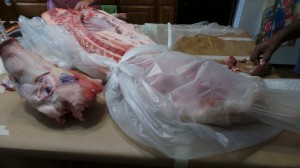
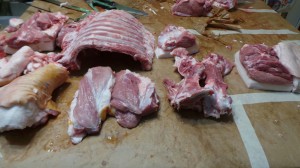
For more info on the Barry Farm, where to get their pork, lamb, eggs and honey and if you want to be notified of a future butcher class, please go to the website at http://thebarryfarm.com/. And be sure to follow them on Facebook also!
Valerie

Thank you so much for the kind words. It was a pleasure to have you and you husband.